History & Mathematics
This is a series of the almanacs dedicated to various aspects of the application of mathematical methods to the study of history and society. It comprises articles that apply mathematical methods to the study of various epochs and scales: from deep historical reconstruction to the pressing problems of the modern world.
Editorial Council:
Daniel Barreiros (Federal University of Rio de Janeiro, Brazil),Herbert Barry III (Pittsburgh University),
Leonid Borodkin (Moscow State University; Cliometric Society),
Robert Carneiro (American Mu-seum of Natural History),
Christopher Chase-Dunn (University of California, Riverside),
Dmitry Chernavsky (Russian Academy of Sciences),
Thessaleno Devezas (University of Beira Interior),
Leonid Grinin (National Research University Higher School of Economics),
Antony Harper (New Trier College),
Peter Herrmann (University College of Cork, Ireland),
Andrey Korotayev (National Research University Higher School of Economics),
Alexander Logunov (Russian State University for the Humanities),
Gregory Malinetsky (Russian Academy of Sciences),
Sergey Malkov (Russian Academy of Sciences),
Charles Spencer (American Museum of Natural History),
Rein Taagapera (University of California, Irvine),
Arno Tausch (Innsbruck University),
William Thompson (University of Indiana),
Peter Turchin (University of Connecticut),
Douglas White (University of California, Irvine),
Yasuhide Yamanouchi (University of Tokyo).
-
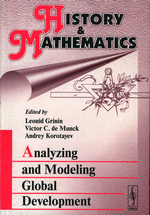
History & Mathematics:
Analyzing and Modeling Global DevelopmentThis almanac initiates a series of edited volumes dedicated to various aspects of the application of mathematical methods to the study of history and society. It comprises articles that apply mathematical methods to the study of various epochs and scales: from deep historical reconstruction to the pressing problems of the modern world.
-
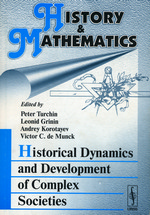
History & Mathematics:
Historical Dynamics and Development of Complex SocietiesThe times of "Pure History" when historians were only interested in the deeds of kings and heroes passed long ago. This almanac continues a series of edited volumes dedicated to various aspects of the application of mathematical methods to the study of history and society. This edited volume considers historical dynamics and development of complex societies.
-
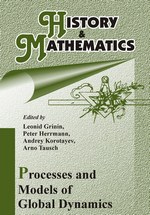
History & Mathematics:
Processes and Models of Global DynamicsThis issue is the third collective monograph in the series of History & Mathematics almanacs and it is subtitled Processes and Models of Global Dynamics. The contributions to the almanac present a qualitative and quantitative analysis of global historical, political, economic and demographic processes, as well as their mathematical models.
-
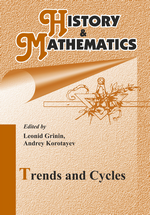
History & Mathematics:
Trends and CyclesThe present yearbook (which is the fourth in the series) is subtitled Trends & Cycles. It is devoted to cyclical and trend dynamics in society and nature; special attention is paid to economic and demographic aspects, in particular to the mathematical modeling of the Malthusian and post-Malthusian traps' dynamics.
-
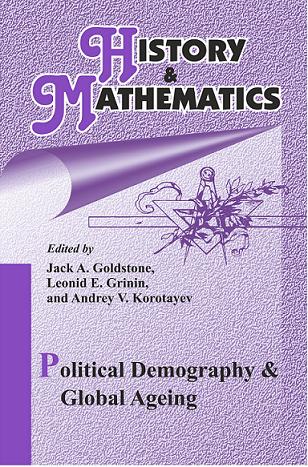
History & Mathematics:
Political Demography & Global Ageing.Among different important issues, which are discussed in Political Demography the issue of global ageing becomes more and more pressing every year. It is sufficient to take into account the point that within two forthcoming decades a rapid global increase in the number of retirement-age persons will lead to its doubling within this fairly small historical period. The concerns about population ageing apply to both developed and many developing countries and it has turned into a global issue. In forthcoming decades the population ageing is likely to become one of the most important processes determining the future society characteristics and the direction of technological development.
-
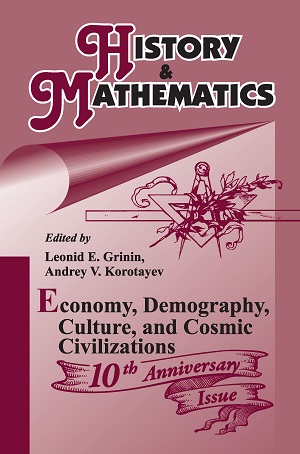
History & Mathematics:
Economy, Demography, Culture, and Cosmic CivilizationsThe present Yearbook (which is the sixth in the series) is subtitled Economy, Demography, Culture, and Cosmic Civilizations. To some extent it reveals the extraordinary potential of scientific research. The common feature of all our Yearbooks, including the present volume, is the usage of formal methods and social studies methods in their synthesis to analyze different phenomena. In other words, if to borrow Alexander Pushkin's words, ‘to verify the algebra with harmony’. One should note that publishing in a single collection the articles that apply mathematical methods to the study of various epochs and scales – from deep historical reconstruction to the pressing problems of the modern world – reflects our approach to the selection of contributions for the Yearbook. History and Mathematics, Social Studies and formal methods, as previously noted, can bring nontrivial results in the studies of different spheres and epochs.
-
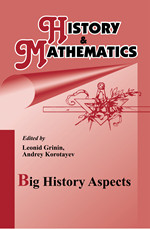
History & Mathematics:
Our Yearbook ‘History and Mathematics’ has already celebrated its 10th anniversary and has confidently entered its second decade. The common feature of all our Yearbooks, including the present volume, is the usage of formal methods and social studies methods in their synthesis to analyze different historical phenomena.
Big History Aspects -
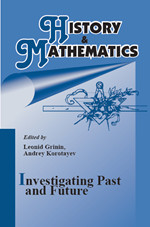
History & Mathematics:
Investigating Past and FutureThe present Yearbook (which is the eighth in the series) is subtitled Investigating Past and Future. It is devoted to three problems: the analysis of the aspects of past and present in the light of formal methods; singularity, i.e. forthcoming abrupt shift in development, the approach (or even presence) of which we already feel; the aspects of the cosmic future of human race.
-
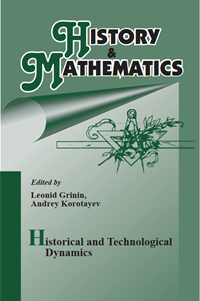
History & Mathematics:
Historical and Technological Dynamics: Factors, Cycles, and TrendsThe present Yearbook is subtitled Historical and Technological Dynamics: Factors, Cycles, and Trends. Its articles demonstrate different forms, patterns, and modes of evolutionary development of societies and their subsystems both over very long periods (in fact, the whole historical process) and over relatively short time intervals. We believe that without an in-depth analysis of the forms and mechanisms of development, it is more difficult to understand both the dynamics of the historical process and many contemporary issues rooted in history.
-
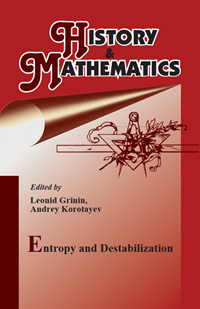
History & Mathematics:
Entropy and DestabilizationThe present Yearbook is subtitled Entropy and Destabilization. It is the tenth in the series. The study of the forms and causes of destabilization is extremely important, because no regime, no society, no system is immune to destabilization. Destabilization, or at least the threat of it, is an inevitable stage in the historical development of any society. The question is to what extent a society is capable of resisting it, how institutionalized and adaptive it is. The articles of this issue are devoted to the various manifestations of destabilization, its different forms, patterns and causes in the past and present.
-
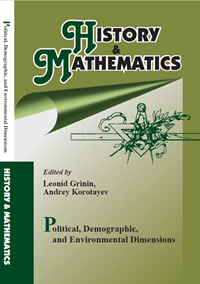
History & Mathematics:
Political, Demographic, and Environmental DimensionsThe present Yearbook, subtitled Political, Demographic, and Environmental Dimensions, is the eleventh in the series. It consists of four sections: (I) Social-Political and Civilizational Aspects; (II) Demography; (III) Climate and Environment; (IV) Reviews.
This issue consists largely of the revised chapters of a report to the Russian Association of the Club of Rome Reconsidering the Limits to Growth. This report is the result of more than ten years of work on modeling and forecasting world dynamics, and it reflects the views of Russian scientists on the future of global development.





